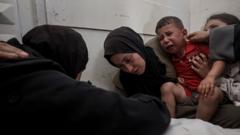After the fall of Bashar al-Assad, Syria's new leadership pledges unity, yet faces daunting sectarian violence that endangers minorities.
Syria's New Government Faces Sectarian Challenges After Civil War

Syria's New Government Faces Sectarian Challenges After Civil War
As Syria grapples with unity post-Assad, sectarian tensions pose grave threats to minority communities.
The recent overthrow of Bashar al-Assad's regime in Syria has ushered in a new government that aims to unify the war-torn country. However, deep-seated sectarian violence threatens to unravel these efforts. Minority communities, particularly the Druse, Alawites, and Kurds, worry that the predominantly Sunni Arab leadership will be unable or unwilling to protect them from violent extremist groups.
Notably, in late April, a series of attacks by Islamist fighters in areas surrounding Damascus claimed the lives of dozens, particularly targeting neighborhoods with significant Druse populations. This prompted Israeli airstrikes against Syrian government forces in a show of solidarity for the Druse community. These assaults follow earlier violence on the Syrian coast, where extremist groups reportedly killed approximately 1,600 individuals, most of whom belonged to the Alawite minority, as reported by the Syrian Observatory for Human Rights.
Despite the proclaimed intention to integrate all factions into a cohesive national military, the presence of extremist elements within the newly formed regime remains a pressing concern. Various minority groups, including the Druse, Alawites, and Kurds, have established their militias during the prolonged civil war and have shown resilience in not disarming since the conflict's conclusion. Additionally, some former Alawite supporters of the deceased Assad government have taken up arms against the current leadership.
In summary, the diversity of Syria's population complicates the path towards national reconciliation and stability, casting a shadow over the new government’s authority. The ongoing sectarian divides continue to pose a challenge to peace and security, as many citizens fear for their lives amidst the uncertainty following a decade of unrest.





















